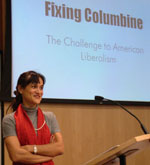Fixing Columbine
When teenagers Dylan Klebold and Eric Harris attacked their Columbine High School teachers and classmates with guns and bombs on April 20, 1999, early observers were quick to seek easily defined reasons for the massacre, said Doriane Coleman, a Duke Law senior lecturing fellow and author of the book “Fixing Columbine: The Challenge to American Liberalism.”

|
| Senior Lecturing Fellow Doriane Coleman listens to a student comment during her presentation on her recent book: Fixing Columbine: The Challenge to American Liberalism. |
Media commentators, civic officials, parents and others blamed easy access to guns, violence in movies and video games or poor parenting for the attack, in which Klebold and Harris killed 13 people, injured 23 and ultimately committed suicide.
But none of those factors was enough standing alone to explain that deadly day in Colorado or the massive upswing in youth violence, depression and suicide of the last few decades, said Coleman, who spoke at the Law School Nov. 15 about her book and the disturbing trends in youth emotional dysfunction it examines.
In her talk and in the book, Coleman describes a confluence of troubles and unmet needs that set the stage for American youths to do untold harm to themselves and to others. “The most important contribution the book makes is in exposing the nature of the epidemic,” she said.
Perhaps chief among the problems is a lack of sound and engaged parenting, which became widespread as women began entering the workforce in greater numbers in the 1970s with no one, men included, replacing them at home, she said. Add to that the number of children who live in single-parent families (mostly with single mothers) and the rising divorce rate, and the result is clear: millions of children spend little to no time with even one parent, let alone two.
“What kids are lacking is day-to-day, hour-by-hour supervision…” Coleman said. “If we want women in the workforce, if we believe in that objective for personal, ideological, or economic reasons, we all have a responsibility to make sure that the children are cared for otherwise.”
Without that supervision, children are more susceptible to a host of influences that, especially when combined, can lead to depression, anxiety, and even suicide and other violent acts, she said. Among those influences are unmediated violent and anti-social television programs and films; violent and anti-social video games; a culture of ostracism and bullying in schools and in other peer situations, and poor or neglectful childcare, including many daycare operations.
Coleman cited various statistics to support her argument that American society is becoming much more damaging to youths. For example:
- The number of serious assaults committed by youths annually has risen 700 percent since World War II.
- From the mid-1980s to the mid-1990s, youth homicides have risen by 168 percent.
- Youth suicide has increased 700-800 percent since the 1950s.
- The United States tops the list of the world’s 25 most industrialized nations when it comes to the number of youth homicides and suicides each year.
Fixing this situation through the law will not be easy, Coleman said. The First Amendment is unfriendly to restrictions that would hamper adults’ free speech rights even if these are to protect children; indeed, courts hold that parents, and not the state, are responsible for shielding children from inappropriate speech. On the other hand, parents have the right to raise their children as they see fit, and, under this rule, the courts have allowed parents wide latitude with respect to the supervision (or not) of children, as well as to the children’s exposures to most of the influences that Coleman sees as destructive. “The Supreme Court has held fast to the doctrines of free speech and parental rights in its jurisprudence,” she said.
Given the state of the law, schools might be the best place to seek reform and relief for youths, she said. Coleman advocated curricular reform of the public schools to assure that they could be
sanctuaries for children who otherwise lack appropriate supervision and who are at risk from exposure to toxic environments in and out of the home. As part of this curricular reform, she suggested
the re-inclusion of training in values (or character education) in the public schools agenda. This concept for the public schools, originates in this country with the founders, she said, who
envisioned a system of education that would instill values as well as academic knowledge.
“In the 1700s and 1800s it was generally understood that education should be focused on the whole child,” she said.
And if children aren’t learning the values they need at home, perhaps they could learn them through a reformed school curriculum. “Kids need to learn self-worth, empathy, respect for others and respect for themselves,” she said. “Children aren’t born with those innate values.”
Coleman concluded her talk noting that “children are the Achilles heel of liberalism,” which is based on the premise that people can choose actions and influences for themselves. “By definition, children — particularly younger children — lack this capacity,” she said. Because of this, it is critical that individuals and societies that are wedded to political systems based in liberal theory purposefully and conscientiously to find ways to protect children’s interests within that structure.
Coleman’s talk was sponsored by Duke Law’s Public Interest Book and Film Club.